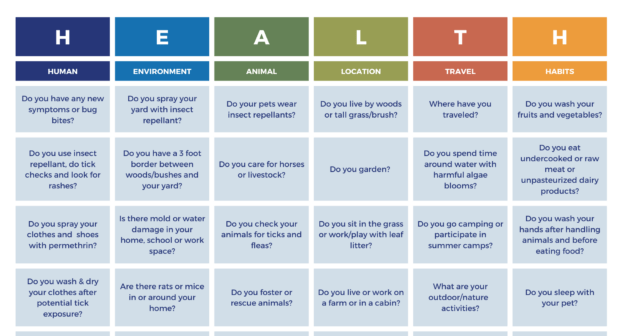Instructors
Elizabeth L. Maloney, MD
Education Co-director, Invisible International
Nevena Zubcevik, DO
Chief Medical Officer, Invisible International
Description
This course provides an overview of the One Health framework and describes how it can be applied in clinical practice. This framework recognizes that the health of people, animals, and the environment are inextricably interconnected. The course uses Lyme disease to illustrate this approach, drawing on relevant peer-reviewed studies on clinical strategies. The course teaches clinicians how to integrate One Health into clinical practice, and introduces a validated symptom questionnaire and a risk assessment tool. These tools will demonstrate how collaborations across human and animal health disciplines are essential to further developing innovative and climate-responsive clinical care.
Learning objectives
- List the major One Health issues
- Describe clinical presentations of early and acute Lyme disease
- Explain which tools you would use to enhance your clinical approach to patients with suspected Lyme disease
This session, One Health Tools for Primary Care, is approved for 1.0 enduring AAFP Prescribed credit.
AAFP Prescribed credit is accepted by the American Medical Association as equivalent to AMA PRA Category 1 credit(s)™ toward the AMA Physician’s Recognition Award. When applying for the AMA PRA, Prescribed credit earned must be reported as Prescribed, not as Category 1.
The AAFP has reviewed One Health Medical Education for a Changing Climate and deemed it acceptable for AAFP credit. Term of approval is from 01/02/2024 to 01/01/2025. Physicians should claim only the credit commensurate with the extent of their participation in the activity.
References
Rabinowitz, P.M., Natterson-Horowitz, B.J., Kahn, L.H. et al. Incorporating one health into medical education. BMC Med Educ 17, 45 (2017). https://doi.org/10.1186/s12909-017-0883-6
https://www.emro.who.int/about-who/rc61/zoonotic-diseases.html
https://www.cell.com/trends/parasitology/fulltext/S1471-4922(16)30010-1
https://www.cdc.gov/mmwr/volumes/67/wr/mm6717e1.html
https://capcvet.org/maps/#/2022/all-year/lyme-disease/dog/united-states
Aucott JN, Yang T, Yoon I, Powell D, Geller SA, Rebman AW. Risk of post-treatment Lyme disease in patients with ideally-treated early Lyme disease: A prospective cohort study. Int J Infect Dis. 2022 Mar;116:230-237. doi: 10.1016/j.ijid.2022.01.033. Epub 2022 Jan 21. PMID: 35066160.
https://www.cdc.gov/lyme/stats/humancases.html
https://storymaps.arcgis.com/stories/f64d0c19a3ab42cf90e8ce38397e96e0
https://pubmed.ncbi.nlm.nih.gov/19403477/
https://pubmed.ncbi.nlm.nih.gov/6967274/
https://pubmed.ncbi.nlm.nih.gov/18829794/
https://onlinelibrary.wiley.com/doi/10.1002/lary.26273
https://pubmed.ncbi.nlm.nih.gov/29720355/
https://www.frontiersin.org/articles/10.3389/fmed.2019.00283/full


